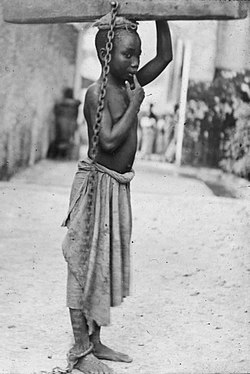
Back Afskaffing van slawerny AF إلغاء العبودية Arabic Abolicionismu AST Abolisionizm AZ Абаліцыянізм BE Аболиционизъм Bulgarian দাসপ্রথা বিলোপ আন্দোলন Bengali/Bangla Abolicionisme Catalan Abolicionismus Czech Diddymu caethwasiaeth CY

| Part of a series on |
| Forced labour and slavery |
|---|
 |
Abolitionism, or the abolitionist movement, is the movement to end slavery and liberate enslaved individuals around the world.
The first country to fully outlaw slavery was France in 1315, but it was later used in its colonies. Under the actions of Toyotomi Hideyoshi, chattel slavery has been abolished across Japan since 1590, though other forms of forced labour were used during World War II. The first and only country to self-liberate from slavery was a former French colony, Haiti, as a result of the Revolution of 1791–1804. The British abolitionist movement began in the late 18th century, and the 1772 Somersett case established that slavery did not exist in English law. In 1807, the slave trade was made illegal throughout the British Empire, though existing slaves in British colonies were not liberated until the Slavery Abolition Act in 1833. In the United States, Pennsylvania and Vermont were the first states to abolish slavery, Vermont in 1777 and Pennsylvania in 1780 (Vermont did not join the Union until 1791). By 1804, the rest of the northern states had abolished slavery but it remained legal in southern states. By 1808, the United States outlawed the importation of slaves but did not ban slavery —except as a punishment— until 1865.
In Eastern Europe, groups organized to abolish the enslavement of the Roma in Wallachia and Moldavia between 1843 and 1855, and to emancipate the serfs in Russia in 1861. The United States would pass the 13th Amendment in December 1865 after having just fought a bloody Civil War, ending slavery "except as a punishment for crime". In 1888, Brazil became the last country in the Americas to outlaw slavery, except for the United States where slavery as punishment is legal. As the Empire of Japan annexed Asian countries, from the late 19th century onwards, archaic institutions including slavery were abolished in those countries.
During the 20th century, the League of Nations founded a number of commissions, Temporary Slavery Commission (1924–1926), Committee of Experts on Slavery (1932) and the Advisory Committee of Experts on Slavery (1934–1939), which conducted international investigations of the institution of slavery and created international treaties, such as the 1926 Slavery Convention, to eradicate the institution worldwide.
After centuries of struggle, slavery was eventually declared illegal at the global level in 1948 under the United Nations' Universal Declaration of Human Rights. By this time, the Arab world was the only region in the world where chattel slavery was still legal. Slavery in Saudi Arabia, slavery in Yemen and slavery in Dubai were abolished in 1962–1963, with slavery in Oman following in 1970. Mauritania was the last country to officially abolish slavery, with a presidential decree in 1981.[1] Today, child and adult slavery and forced labour are illegal in almost all countries, as well as being against international law, but human trafficking for labour and for sexual bondage continues to affect tens of millions of adults and children.
- ^ "Slavery's last stronghold", CNN. March 2012.